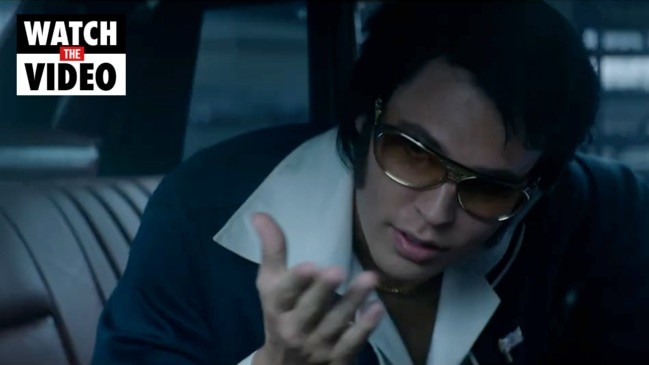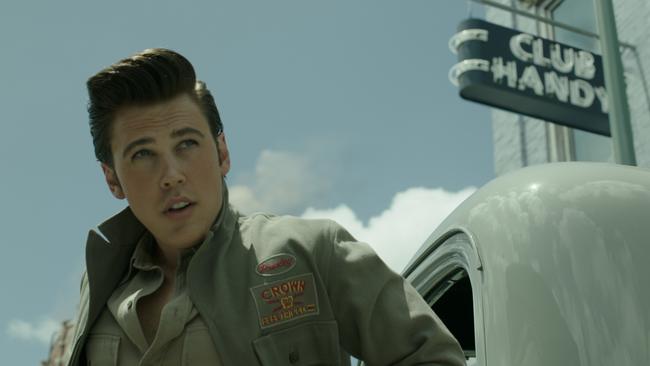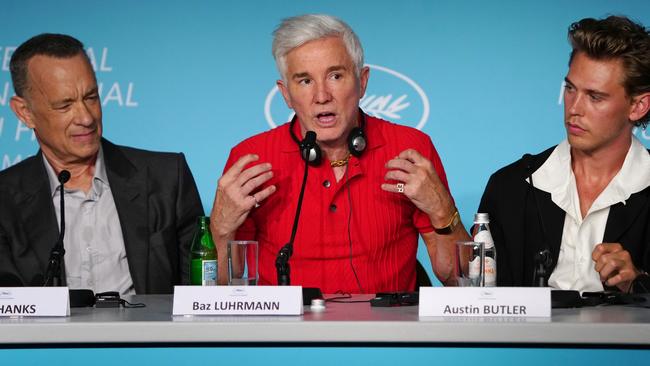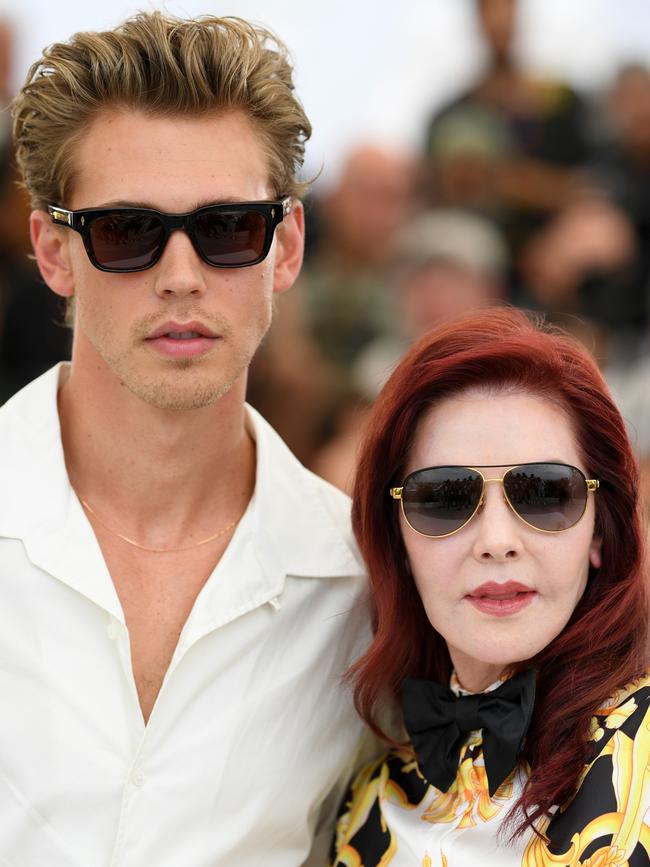How Austin Butler avoided the Elvis impersonator trap for Baz Luhrmann’s biopic on the King
Austin Butler reveals how he transformed into Elvis Presley from the inside out for Baz Luhrmann’s Queensland-shot biopic and why the critics are raving about him.

SmartDaily
Don't miss out on the headlines from SmartDaily. Followed categories will be added to My News.
Austin Butler knew immediately when he signed up to the herculean task of playing Elvis Presley on screen that whatever he came up with had to be an interpretation, rather than impersonation.
Ever since the King of Rock’n’Roll passed away in 1977 at the tragically young age of 42, Elvis impersonators have thrived, from the glittering casinos of Las Vegas to the rural NSW town of Parkes and its annual festival.
“Ultimately, the life is what is important and we realised you can impersonate somebody, but to find the humanity and the life within and the passion and the heart, I had to release myself from the constraints of that and try to live the life as truthfully as possible,” says Butler.
Baz Luhrmann, who directed Elvis, will accompany Butler on the red carpet at the Australian premiere on the Gold Coast on Saturday and then on Sunday night in Sydney. With them will be Luhrmann’s co-producer and designer wife Catherine Martin, and stars Tom Hanks, who plays Elvis’s Machiavellian manager Colonel Tom Parker, and compatriot Olivia DeJonge, who plays Priscilla Presley.
The Aussie director, fresh from a 12-minute standing ovation at the Cannes Film Festival, confirms that “Austin’s number one mission, from the moment I met him, was to humanise Elvis”.

To help him do that for the Queensland-shot, big-budget biopic that spans the famous entertainer’s entire life, Luhrmann first immersed the American actor in Elvis footage and music, and then encouraged him to dig much deeper.
For around a year before cameras even rolled, Butler consumed everything he could get his hands on to try to capture the mannerisms and the soul of the rock’n’roll pioneer who was one of the most influential figures of the last century.
“First, I just watched as much as I could – over and over and over,” Butler says. “I didn’t look at or read, or hear anything that didn’t have to do with Elvis for a long time.
“Thankfully there’s so much incredible footage out there but he also he moved very differently in the ’50s and ’60s and ’70s. And that’s just breaking it into three sections, then there’s many variations between those decades.”
But as useful as Butler found that immersive experience, it wasn’t until he started working with Polly Bennett, the choreographer and movement coach who helped Rami Malek win an Oscar for playing Queen front man Freddie Mercury in Bohemian Rhapsody, that he felt he was really getting to where he needed to be.
“Rather than looking at the external of how he may touch his face or how he moves his legs on stage or any physical thing that seems external, you ask the question, ‘well, why does he do that? What is really coming up inside?’ And then I found that once you do that enough, then it stops feeling external and it suddenly just feels like it’s a part of you.”

Equally important for Butler’s portrayal was how to nail one of the most distinctive voices in music history, a gospel and blues inspired instrument that could deliver anything from a primal yelp to sexy soul and rock belters to country croons.
“They are huge shoes to fill,” admits Butler. “When I began the process of this, I set out to get my voice to sound identical to his. That was my goal – if you heard a recording of me and you heard a recording of him you wouldn’t be able to tell the difference. I held that for a long time … and it instils this fear that I’m not going to achieve that. That got the fire burning inside me to work and work and work and work.
“For maybe a year before we even started shooting I was doing six, seven days a week of voice coaching and working with different experts and just trying to get the register to be in the right place and the dialect and the ways he inflects and everything.”
Luhrmann was motivated for Butler to nail the Elvis sound in the film for practical reasons too. While the later Elvis songs in the soundtrack, mostly recorded at the revered RCA Studio in Nashville, used the man himself (blended with Butler), the earlier recordings from the famous Sun Studios in Memphis were made in mono, giving them a distinctive, dated sound.

“All those early recordings from before the ’60s, you really can’t use in a film,” says Luhrmann. “So fundamentally, from the get-go, it couldn’t be a jukebox musical because they are recorded mono and so they’re nostalgic sounding. So the idea that you believe that someone’s miming it, you’re miming a very old record. You can reproduce it with a sound-alike, but what you’re actually doing is a photocopy of a performance.”
Butler says he felt “an incredible responsibility” portraying Presley, not just to the King, but to those close to him – including wife Priscilla and daughter Lisa Marie – and his legions of fans around the world.
Luhrmann and his team were granted access to Graceland, the singer’s famous home in Memphis, and the director said in Cannes last week that Priscilla’s review was the only one he really cared about. Thankfully both she, her daughter Lisa Marie and granddaughter Riley Keough gave it the thumbs up.
“I’ve seen Elvis the film, I watched the trailer over a dozen times,” Priscilla wrote on Instagram. “But the words I heard from my daughter on how much she loved the film and that Riley will love it too when she sees it brought tears. I relived every moment in this film. It took me a few days to overcome the emotions as it did with Lisa.”
And while the reviews of the biopic out of Cannes have been mixed, they have been nearly unanimous in their praise of Butler for capturing the swagger, sexiness, danger and vulnerability of Elvis in his meteoric rise and drug-addled decline.
Butler says that he grew into the role, likening it at first to putting on your father’s suit when the sleeves are too long and the shoes too big.
“In the beginning I thought ‘this is impossible – how could I possibly do anything but feel like I’m less than this superhuman individual’,” he says. “And then as time passed, at least for me, I started to feel like I grew into it, and suddenly I felt his humanity more.”
Elvis opens in cinemas on June 23.
Originally published as How Austin Butler avoided the Elvis impersonator trap for Baz Luhrmann’s biopic on the King


